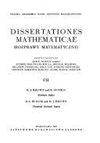A general integral
IF 0.8
3区 数学
Q1 MATHEMATICS
引用次数: 5
Abstract
We define an integral, the distributional integral of functions of one real variable, that is more general than the Lebesgue and the Denjoy-Perron-Henstock Kurzweil integrals, and which allows the integration of functions with distributional values everywhere or nearly everywhere. Our integral has the property that if f is locally distributionally integrable over the real line and psi is an element of D(R) is a test function, then f psi is distributionally integrable, and the formula = (dist)integral(infinity)(-infinity) f(x)psi(x)dx, defines a distribution f is an element of D'(R) that has distributional point values almost everywhere and actually f(x) = f(x) almost everywhere. The indefinite distributional integral F(x) = (dist) integral(x)(a) f(t)dt corresponds to a distribution with point values everywhere and whose distributional derivative has point values almost everywhere equal to f (x). The distributional integral is more general than the standard integrals, but it still has many of the useful properties of those standard ones, including integration by parts formulas, substitution formulas, even for infinite intervals (in the Cesaro sense), mean value theorems, and convergence theorems. The distributional integral satisfies a version of Hake's theorem. Unlike general distributions, locally distributionally integrable functions can be restricted to closed sets and can be multiplied by power functions with real positive exponents.一般积分
我们定义了一个积分,一个实变量函数的分布积分,它比Lebesgue积分和Denjoy-Perron-Henstock Kurzweil积分更一般,它允许在任何地方或几乎任何地方对具有分布值的函数积分。我们的积分有这样的性质如果f在实线上是局部分布可积的而psi是D(R)的一个元素是一个测试函数,那么f是分布可积的,公式= (dist)积分(∞)(-∞)f(x)psi(x)dx,定义了一个分布f是D'(R)的一个元素它几乎处处都有分布点值实际上f(x) = f(x)几乎处处都有分布点值。不定分布积分F(x) = (dist)积分(x)(a) F(t)dt对应于一个处处都有点值的分布,其分布导数几乎处处都有点值等于F(x)。分布积分比标准积分更一般,但它仍然具有许多标准积分的有用性质,包括分部积分公式,代换公式,甚至对于无限区间(在Cesaro意义上),中值定理和收敛定理。分配积分满足哈克定理的一个版本。与一般分布不同,局部分布可积函数可以被限制为闭集,并且可以被幂函数相乘。
本文章由计算机程序翻译,如有差异,请以英文原文为准。
求助全文
约1分钟内获得全文
求助全文
来源期刊
CiteScore
2.80
自引率
0.00%
发文量
8
审稿时长
>12 weeks
期刊介绍:
DISSERTATIONES MATHEMATICAE publishes long research papers (preferably 50-100 pages) in any area of mathematics. An important feature of papers accepted for publication should be their utility for a broad readership of specialists in the domain. In particular, the papers should be to some reasonable extent self-contained. The paper version is considered as primary.
The following criteria are taken into account in the reviewing procedure: correctness, mathematical level, mathematical novelty, utility for a broad readership of specialists in the domain, language and editorial aspects. The Editors have adopted appropriate procedures to avoid ghostwriting and guest authorship.

 求助内容:
求助内容: 应助结果提醒方式:
应助结果提醒方式:


